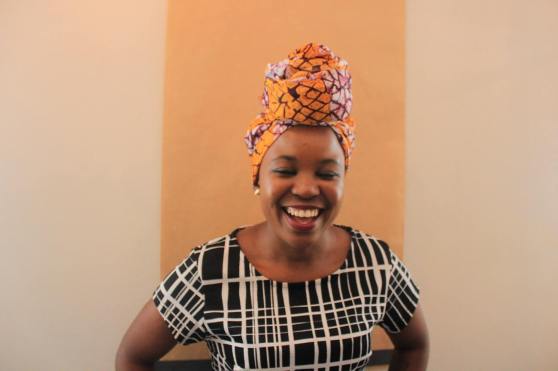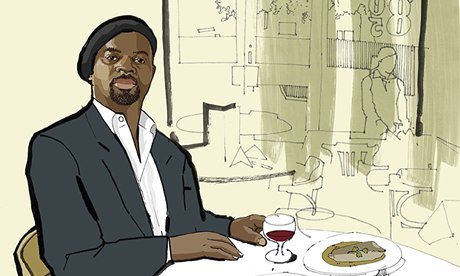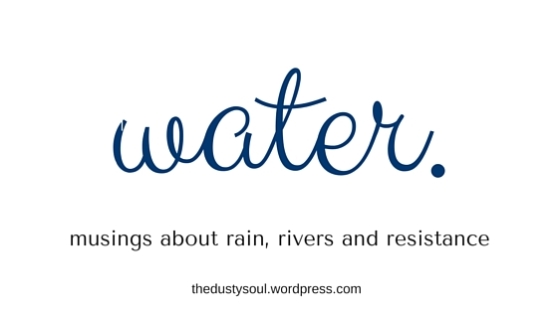Let me tell you a story.
Once upon a time, there was a girl who met a boy, suave, tall, dark, handsome. And she fell in love with his afro moon and the way he commanded attention with his charisma. He would write letters, and draw pictures for her, and the moTswana girl would see stars and galaxies when he spoke, shyly flashing the smile she would pass on to her first child, who would be fathered, as it turned out, by this very smooth operator who was the reason she was thinking wedding gowns and cattle already. He looked at her and saw a world beginning, a new world that they would build together and they became, one. This one, gave birth to another one, at the most random time. It was a normal day, and would have been extremely boring had her water not broken in the middle of an isle at Pick n Pay (true story), amongst the soap bars and toothpaste perhaps, with the suggestion of two-for-one specials and 20% off house brand cosmetics beaming at her as she groaned with contractions. I mean, the sky did not move, it was a normal day, when I came, and yet I was here, I too had arrived to this Life that God had made.
As children we read stories that began with “Once upon a time”. It is a decidedly English phrase, very ambitious, I think. It claims a greatness it does not live up to. Once upon a time? Time? Really? Its aim is lofty. But I guess we all have our own ways of storytelling. My once upon a time begins in 1991. It really should have been a “Giringan wa giringan”, or a “Keleketla!”, a “Kwasuka sukela”, or a “Kwath kwathi ngantsomi”. Which are the ways that the vaTsonga, baTswana, amaZulu and amaXhosa respectively, begin their tales.
“Once upon a time”, you see, is not the African way of doing things. In a gathering of say, children and adults, usually women and children, “Giringan wa giringan” is a call to attention. “Gather together”, it beckons, “because a story is about to be told”. The speaker will make the call, and those gathering will respond with “Giringan!”, or “Cozi!”
At different pauses in the story, the listeners will encourage the storyteller with repeated shouts of “Giringan!”, “Keleketla!” or “Cozi!”
So the story would go, for instance:
Storyteller: “Giringan wa giringan”
Listeners: “Giringan”
Storyteller: “Akuri na ntombi yo saseka”
Listeners: “Giringan”
Storyteller: “Leyi a yi tsutsuma ku tlula na vafana va le xikolweni”
Listeners: “Giringan”
And so forth, until such a time as the story is concluded to the teller’s satisfaction. During this interaction, because African folktales are always more dialogue than monologue, the listeners can interject with questions, comments, or even alternate scenes. So it would not be foreign for a listener to say, “Ayi tsutsuma ku va tlula? Njani?” or perhaps, “Jhee!” accompanied by a side eye or some other form of shade. Random story, I know, but my point is that the teller has the prerogative to shape the endings to the audiences’ context, so that the story about how the leopard got its spots ends up with five different variations, because in each context the teller-listener-relationship results in collaboration that presents alternate endings. No two storytellers tell the same story. But at the same time, the listener is implicated in the process; unlike in the tyranny of the text, where a reader is all but held hostage by the fixed nature of the print. In this instance, they are not just listening, they are called on to create as well.

Photo: Dennis Ngango
Now, just a moment: I am most certainly a writer, and I love and believe in the power of the written word. But I do not think that it can exist without oral literature, or as I prefer to call it, orature. In the beginning was the word, and the word begat a story, and the story begat a rhythm, and the rhythm begat a revolution. That rhythm is not limited to written words, though there is value in that. Every important thing must be said in a story. Academia is nice, it is necessary, but if we want to measure the zeitgeist, or define it, or influence conversation, one of the places which we must first look, is stories. Stories do all the important work, really, and they are most effective because they are so unassuming. We do not know it, but when we encounter stories, we are in the classroom.
The moTsonga man with the afro moon and the moTswana woman with the everlasting smile welcomed their little girl into the world with enthusiasm, and vowed to send her into the world a moTsonga girl. This is what is right, this is what culture said they needed to do. You marry, if you are his wife, and are born into, if you are his seed, a man’s culture. In addition, they would send her to a Model C school, they would raise her in a township that was predominantly xiTsonga speaking, and they would speak to her in his language. The little girl’s mother would learn the moTsonga man with the afro moon’s language, though she stumbled through it, she soldiered on. They drew neat lines and built their lives within those boundaries, squashing their daughter’s complex identities into a single way of being. She was never Tsonga enough for the xiTsonga speaking people, and never Tswana enough for the seTswana speakers, and yet, here she was, an inconvenient truth. Everything she knew about culture and identity was one thing, but her life repeatedly presented her with contradictions to the ideals of family and culture. She was a deviant, she was other.
I am ‘other’ – a position of not belonging. Because I am a woman, a Black woman, in a world that hates Black women but demands from them constantly. To create, to hold things together, to not break. I am other because I love God in a world that either blames Him for its injustice, or uses Him to cause it. I am other because I am Black – basically, plankton in the food chain of human life. I am other because my father is a moTsonga in a country that reduces us to stereotypes: loud, what they say is ‘unbearably dark’, ugly, smelly, badly dressed, kwerekwere, and the list continues. I am other because I am both a moTsonga and a moTswana, and despite what society dictates, I embrace all parts of my heritage. I am not either/or, I am both.
I am other because I have lived a life in which as a young girl, my white friends wanted me to be myself, but not too much, lest any part of my Blackness disrupt the serenity of their cushioned realities. White people have the privilege of being themselves without consequence for their race. As Ta Nehisi Coates says about “the invention of racecraft”: “they [meaning white supremacists] made us into a race. We made ourselves into a people.” It is a miracle how we are able to carry on, in spite of… and yet the moment that we ‘show’ ourselves, in a way that is perceived as either negative or positive, we are sanctioned. I understood this as a child, that my place in the world came with the burden of my race, and my womanhood.
Only black people are raced. We could build clubhouses together at the back of the school, but when it came down to it, they would get picked up from school by their mothers, and I would take the bus home, get off at the bus stop, walk home, and open the door to an existence that was as different from theirs as the colour of our skins. And to my Black friends, I was a coconut, the snob who spent too much time with white people, stayed in the house all day, and did not have friends in her own neighbourhood. Always struck me as odd that there were clear lines drawn in the sand for lives that are, very clearly, messy and unpredictable. As though much of our ways of being are not learned and reproduced subconsciously. As though we are not always becoming, shifting and navigating the spaces in which we move and have our being.
We exist in the push and pull. In the tension. Author Ben Okri says of it, “We lead fragmented lives, fragmented identities”. And so the middle, not between two lines but where boundaries touch, exactly at the line that joins two different realities, that is where we live our messy lives.
It is a complicated thing, with a complicated history, but it is not my ending.

Photo: Puno Selesho
Toni Morrison described it best when she said, “We are the subjects of our own narrative, witnesses to and participants in our own experience, and, in no way coincidentally, in the experience of those with whom we have come in contact. We are not, in fact, “other”. We are choices.”
I thought that was so powerful, and it’s a mantra that I live by – “We are choices.” We are crafting a new story each day. We can push back. Despite oppression, despite the fact that my name is not shouted from the rooftops. I slither in silence like a snake, not quite as menacing but twice as deliberate, certain, and present. You will know it when I strike, and I intend to strike.
In every story there is a villain, and mine is a many headed monster: heterosexist patriarchy, is written across the first head. Capitalism, on another. White supremacy, on the next. This is the monster against which I intend to strike.
My country beckons me – it beckons you. Maybe God gave us fragility, our Achilles heel, to remind us that we are only as great as others have allowed us to be. Our greatness is not a solitary project.
In the BBC documentary How My Country Speaks, Lebo Mashile shares what she thinks being a South African means, it is quite lengthy, bear with me:
“South Africa feels like a social experiment with 50 million people trying to figure out where we all fit in. If you are white, you are the descendants of settlers, you don’t fit in. If you are Black you’ve been dispossessed so you don’t fit in. If you are coloured then you’re too complicated, you’re mixed race, you don’t fit in. Everybody can find ten different reasons why they don’t belong to this thing called South African-ness, and that quintessentially is kind of what makes us South African.”
She then goes on to recite a poem. Part of it goes:
“South Africa is a fractured mirror, a paradox of schizophrenic selves who don’t talk to one another, who co-exist together but don’t live with each other. Who fear each other. Who revere each other. Who loathe, and pretend, and try to blend in with each other. And this is the time when you can become the greatest substance of your dreams unless you live in a shack, and don’t speak English and don’t know what this poem means.”
Could it be then, that another head on the monster which is the villain of our South African story, is our wounded-ness? We are haunted by the ghosts of our past, by our pain. Our nostalgic leanings, our desires for an untouched past, to return to a pristine and untouched Africa, are a longing for our wholeness. Coates refers to it as a “return to ourselves”. I think he is talking about healing. He is talking about coming home to ourselves.
I am not talking about the model that the truth and reconciliation commission set forth at the dawn of democracy. It was with noble intentions that they did that, but what it did, was suppress Black pain, and let unrepentant murderers go scot free. The TRC and Rainbow Nation-ism, are part of why I am skeptical when I hear white people, and even some Black people, use the word ‘ubuntu’, or ‘botho’. What they should be meaning is justice. Instead what they mean, more often than not, is absolution from crimes they did not intend to pay for, and the chance to not think about their privilege too much. Think Chris Hani and the wounds his family still carries. Think Nokuthula Simelane and her family’s search for truth for over thirty years. Their blood still cries out. Do you hear it? Or are you more concerned, with living a comfortable life?
We want desperately to know, who is African? Who is not ‘othered’ here? Who gets to ‘belong’, here?
Personally I think that anyone may belong here, whatever race they are, for as long as they get with the program, so to speak. Africa is a state of mind. What drives you? Shared responsibility, common justice and equity? Africa is a commitment. For whom do we build our futures? How do we build? Are we willing to decolonise, so that we can build something new?
Sonia Sanchez said it so beautifully when she said, and I live by this mantra, “I will become, I will become a collector of me, and put meat on my soul.”
And so I would like to start my story again, because mind you, my story is always starting and ending and starting and that is its greatest continuity, the birth and death that is always happening. So yes, let me start again, Giringan wa giringan?
**This essay was presented as a talk at The Park Exchange’s first speaker edition. The theme was “Race, Identity, and what it means to be an African”. It has been edited for brevity and clarity. Look out for the next speaker edition, happening in Pretoria this Saturday.
Power, strength, healing, and happy Africa Day.
Dusty
No one is original. Everyone is derivative. ~ Sonny Rollins







